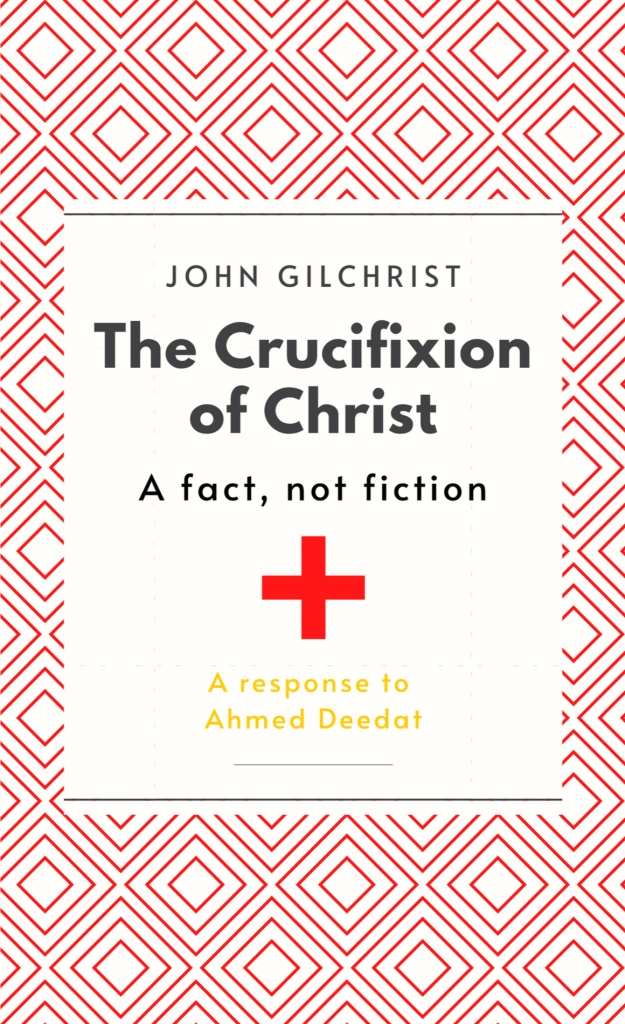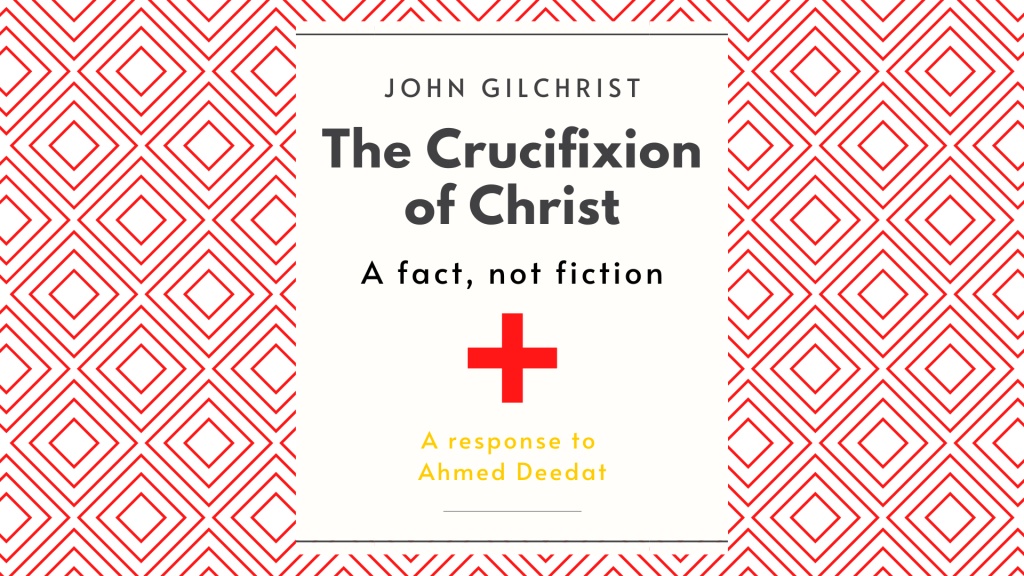Did Jesus Plan an Attempted Coup?
The Crucifixion of Christ: A Fact, not Fiction


Chapters
- Introduction
- Did Jesus Plan an Attempted Coup?
- The Image of Jesus in Deedat's Booklets
- Did Jesus Defend Himself at His Trial?
- The Theory that Jesus Survived the Cross
- Wild Statements in Deedat's Booklet
- Gospel Truths Deliberately Suppressed by Deedat
- Ahmed Deedat's Crucifixion Theory - A Muslim Perspective from Mohammed Bana
Deedat constantly employs a theme in the early part of his booklet to the effect that Jesus planned a coup during his last week in Jerusalem which eventually had to be aborted. Under the heading 'An Aborted Coup' he says "... his high hopes did not materialise. The whole performance fizzled out like a damp squib..." (Deedat, Crucifixion or Cruci-fiction?, p. 10). It must come as a surprise to all Christians and Muslims to hear a new argument, first conceived nearly twenty centuries after the event, that Jesus was planning a political coup. For the one thing Jesus constantly avoided was any involvement in the politics of his day. He refused to be drawn into debates on the merits of paying taxes to the Roman oppressor (Luke 20:19-26), withdrew from the crowds when they wanted to make him a political leader (John 6:15), and regularly taught his disciples not to be like those who sought political power (Luke 22:25-27).
The Jews did everything they could to convince Pilate, the Roman governor, that Jesus was advocating a revolt against Caesar (Luke 23:2) and yet even Deedat, in an unguarded moment, is constrained to admit that this charge "was absolutely false" (p.27). It is thus of great significance to find that even Deedat acknowledges that Jesus "did not look like a Zealot, a political agitator, a subversive person, a terrorist!" (p.27) and goes on to say in his booklet:
His was a spiritual kingdom, a ruler to rescue his nation from sin and formalism.(Deedat, Crucifixion or Cruci-fiction?, p.27).
It is therefore all the more remarkable to find him attempting to prove elsewhere in his booklet that Jesus was indeed plotting a political coup to deliver the Jews from their overlords. His comments on page 27 of his booklet unwittingly pull the carpet right out from underneath his own thesis! He admits that Jesus was not planning a revolution.
The theory is in any event absurd as appears from an analysis of some of Deedat's arguments in its favour and we shall briefly consider these to prove the point. We begin with his treatment of Jesus' statement just before his arrest that those of his disciples who had no sword should sell their garments and buy one (Luke 22:36). He interprets this to mean that Jesus was calling them to arms and to prepare for a jihad a "holy" war, whatever that might be. What followed on this statement of Jesus is of great significance. His disciples said:
"Look, Lord, here are two swords". And he said to them, "It is enough". Luke 22:38
Two swords would hardly be "enough" to stage a revolution and it is obvious that Jesus meant "enough of that", that is, your misunderstanding of what I am saying. Nevertheless, because he is trying to convince his readers that Jesus was planning a coup, he is at pains to argue that two swords would have been enough to overthrow the whole Jewish hierarchy in Israel and immediately thereafter their Roman overlords! As is to be expected, his argument is hardly persuasive. He resorts to further flights of fancy in suggesting that Jesus' disciples were "armed with sticks and stones" (p.13) like some riotous mob. There is not a shred of evidence in the Bible to support this claim, raised by Deedat purely to try and mitigate the strange anomaly that Jesus would consider two swords sufficient to stage a major revolt! At another place Deedat says:
The disciples of Jesus always misunderstood him. (Deedat, Crucifixion or Cruci-fiction?, p.23).
The word "always" is in bold print in this quote in his booklet. Once again Deedat has unwittingly contradicted himself for, if Jesus intended that his disciples should arm themselves to the hilt as Deedat suggests, then his disciples understood him perfectly, for this is precisely what they took his statement to mean. But he is right in saying that the disciples regularly misunderstood him - here as much as at any other time. We need to consider what Jesus said just after saying that they should purchase swords to get a better understanding of this matter. He said:
"For I tell you that this scripture must be fulfilled in me, 'And he was reckoned with transgressors'; for what is written about me has its fulfillment". Luke 22:37
The scripture he quotes is from Isaiah 53, a prophetic chapter written about seven hundred years beforehand in which the prophet Isaiah foresaw the suffering of the Messiah on behalf of his people in which he would make himself an offering for sin (Isaiah 53:10). The whole verse from which Jesus quoted reads as follows:
Therefore I will divide him a portion with the great, and he shall divide the spoil with the strong; because he poured out his soul to death, and was numbered with the transgressors; yet he bore the sin of many, and made intercession for the transgressors. Isaiah 53:12
Jesus plainly stated that this prophecy was about to be fulfilled in him and its meaning is abundantly clear. He would "pour out his soul to death" the following day on the cross and would be "numbered with the transgressors" (he was duly crucified between two thieves - Luke 23:33). Yet he would "bear the sin of many" as he atoned for the sins of the world on the cross and would "make intercession for the transgressors" (he prayed for his murderers from the cross - Luke 23:34). Because of this gracious work God would grant him to "see the fruit of the travail of his soul and be satisfied" (Isaiah 53:11) and would give him "the spoil" of his victory - a clear prediction of his resurrection.
Deedat ignores the full statement of Jesus because it contradicts his purpose, but it is surely clear that Jesus was anticipating his crucifixion, death and resurrection as the Saviour of the world and was not planning a coup as if he were a common upstart. The imminent events would take Jesus away from his disciples, and his exhortations to buy purses, bags and swords was a colloquial way of advising them to prepare to earn their own living once he had gone.
Central to Deedat's theme of an abortive coup is the argument that the entry of Jesus into Jerusalem a week earlier among a crowd of disciples hailing him as the Messiah was a march on Jerusalem. He uses these exact words when he says:
The march on Jerusalem had fizzled out. (Deedat, Crucifixion or Cruci-Fiction?, p.21).
Under the heading 'March into Jerusalem' Deedat acknowledges that Jesus expressly rode into the city seated on a donkey. Surely this was a most unlikely vehicle of conveyance for a coup Jesus clearly chose it because donkeys symbolise peace and docility, and he wished to show Jerusalem that he was coming in peace and was fulfilling this promise of God recorded in another prophecy centuries earlier:
Rejoice, greatly, O daughter of Zion! Shout aloud, O daughter of Jerusalem! Lo, your king comes to you; triumphant and victorious is he, humble and riding on an ass. Zechariah 9:9
He came in humility and peace on a beast which symbolised his purpose. "He shall command peace to the nations", the prophecy continues (Zechariah 9:10). It is grossly absurd to suggest that Jesus was heading a "march" or that he was instigating a violent "armed struggle" as people would say today.
Deedat conveniently overlooks the fact that just as Jesus was about to be arrested the same night his disciples cried out, "Lord, shall we strike with the sword?" (Luke 22:49). One of them struck the servant of the high priest and cut off his ear, but Jesus immediately rebuked him and healed the man who had been injured. All the evidence shows that he was not planning a destructive coup at all but was preparing for the supreme gesture of love he was to exhibit to the world in his pending suffering and death on the cross for the sins of men. In the same book quoted above we read that God once promised:
"I will remove the guilt of this land in a single day". Zechariah 3:9
That day had just arrived, and Jesus was making himself ready to "secure an eternal redemption" (Hebrews 9:12) by taking away the sins of the world on that fateful Friday for which he had come.
The theory that Jesus was planning an abortive coup is a gross injury to his gracious dignity and a shocking caricature which one does not expect from a man who is supposed to believe that Jesus was one of the greatest men who ever lived.
Deedat has never done military training and his ignorance in this field is exposed on page 14 of his booklet where he suggests that Jesus took Peter, James and John with him into the Garden of Gethsemane as an inner line of defence with eight more guarding the gate. He boldly suggests that this was a masterly tactic "that would bring credit to any officer out of 'Sandhurst'", a "leading military academy in England" (p.14). A former officer in the British Army once commented on this claim by saying to me 'that he had never heard such things taught at Sandhurst! Deedat says of the eight disciples that Jesus left at the gate:
He positions them strategically at the entrance to the courtyard; armed to the hilt, as the circumstances would allow. (Deedat, Crucifixion or Cruci-Fiction?, p.14).
He goes on to say that he took Peter, James and John, "these zealous Zealots (the fighting Irishmen of their day)" (p.14), to prepare his inner defense. This argument flounders on closer analysis. Peter, James and John were peaceable fishermen from Galilee (Jesus had only one Zealot among his disciples and 5 it was none of these three - Luke 6:15) and they were his closer circle of disciples throughout his Ministry. On the occasion of his transfiguration these same disciples alone went up the mountain with him while the rest mingled with the crowds below (Matthew 17:1, Matthew 17:14-16). Likewise, when he raised the daughter of Jairus from the dead, he again took the same three disciples with him into the house (Luke 8:51). He often took these three disciples, Peter, James and John, into his closest confidence on appropriate occasions and this shows clearly that Jesus was not planning a masterly defence in Gethsemane when he took them with him into the inner part of the garden. Rather, he was once again seeking their close fellowship on yet another of those important occasions when he desired only the intimate companionship of his closest disciples. All this shows quite conclusively that there is no substance in the argument that Jesus was planning a coup.